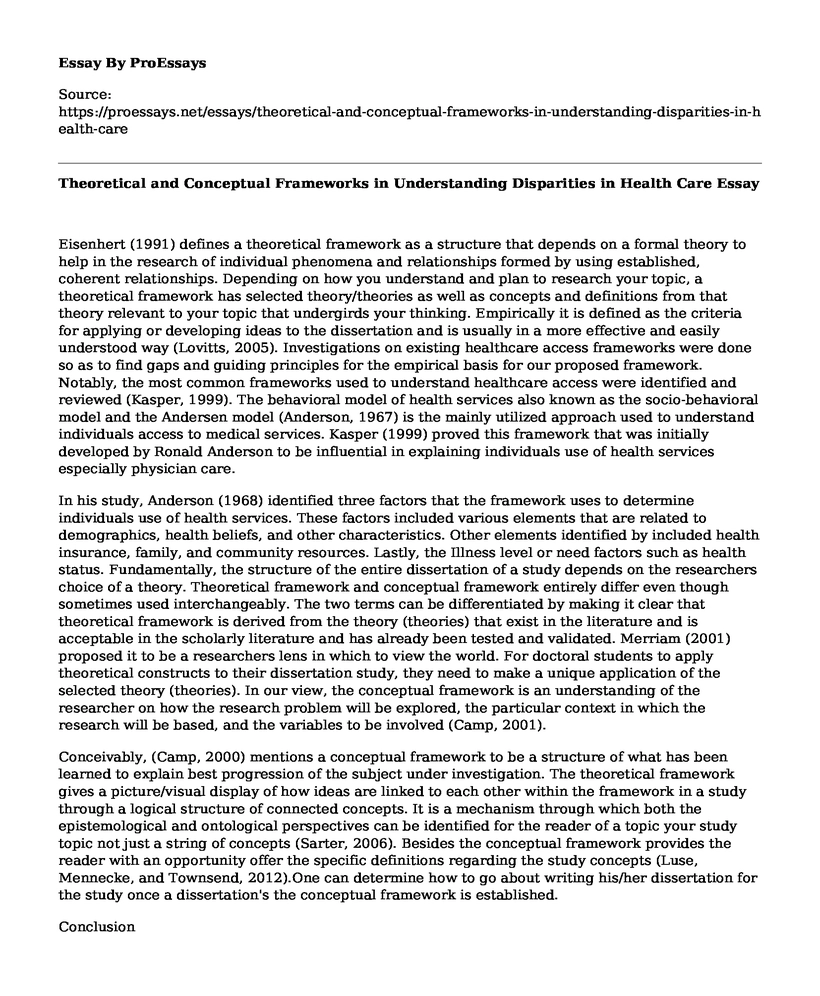Eisenhert (1991) defines a theoretical framework as a structure that depends on a formal theory to help in the research of individual phenomena and relationships formed by using established, coherent relationships. Depending on how you understand and plan to research your topic, a theoretical framework has selected theory/theories as well as concepts and definitions from that theory relevant to your topic that undergirds your thinking. Empirically it is defined as the criteria for applying or developing ideas to the dissertation and is usually in a more effective and easily understood way (Lovitts, 2005). Investigations on existing healthcare access frameworks were done so as to find gaps and guiding principles for the empirical basis for our proposed framework. Notably, the most common frameworks used to understand healthcare access were identified and reviewed (Kasper, 1999). The behavioral model of health services also known as the socio-behavioral model and the Andersen model (Anderson, 1967) is the mainly utilized approach used to understand individuals access to medical services. Kasper (1999) proved this framework that was initially developed by Ronald Anderson to be influential in explaining individuals use of health services especially physician care.
In his study, Anderson (1968) identified three factors that the framework uses to determine individuals use of health services. These factors included various elements that are related to demographics, health beliefs, and other characteristics. Other elements identified by included health insurance, family, and community resources. Lastly, the Illness level or need factors such as health status. Fundamentally, the structure of the entire dissertation of a study depends on the researchers choice of a theory. Theoretical framework and conceptual framework entirely differ even though sometimes used interchangeably. The two terms can be differentiated by making it clear that theoretical framework is derived from the theory (theories) that exist in the literature and is acceptable in the scholarly literature and has already been tested and validated. Merriam (2001) proposed it to be a researchers lens in which to view the world. For doctoral students to apply theoretical constructs to their dissertation study, they need to make a unique application of the selected theory (theories). In our view, the conceptual framework is an understanding of the researcher on how the research problem will be explored, the particular context in which the research will be based, and the variables to be involved (Camp, 2001).
Conceivably, (Camp, 2000) mentions a conceptual framework to be a structure of what has been learned to explain best progression of the subject under investigation. The theoretical framework gives a picture/visual display of how ideas are linked to each other within the framework in a study through a logical structure of connected concepts. It is a mechanism through which both the epistemological and ontological perspectives can be identified for the reader of a topic your study topic not just a string of concepts (Sarter, 2006). Besides the conceptual framework provides the reader with an opportunity offer the specific definitions regarding the study concepts (Luse, Mennecke, and Townsend, 2012).One can determine how to go about writing his/her dissertation for the study once a dissertation's the conceptual framework is established.
Conclusion
Theoretical and conceptual frameworks are different in their genesis, meanings, and their relation to the literature review, the methodological approaches they bring about and the extent to which they are applied. The purpose of a theoretical framework is considerably similar to that of a conceptual framework once a conceptual framework has been established. However, a conceptual framework tends to lead further research when it is determined from existing literature or freshly collected data. The findings of these researchers over period results to theory specification where a theoretical framework may, thus, evolve.
References
Andersen R. Behavioral model of families use of health services. Chicago (IL): University of Chicago,Center for Health Administration Studies; 1968. (Report No. 25).
Anderson JG. Demographic factors affecting health services utilization: a causal model. Med Care. 1973;11(2):10420.
Camp, W. G. (2001). Formulating and evaluating theoretical frameworks for career and technical education research. Journal of Vocational Educational Research, 26(1), 27-39.
Kasper JD . Health-care utilization and barriers to health care. In: Albrecht GL, Fitzpatrick R, Scrimshaw SC, editors. Handbook of social studies in health and medicine. Thousand Oaks (CA): Sage Publications; 1999. p. 32338
Liehr P, Smith MJ 1999. Middle range theory: Spinning research and practice to create knowledge for the new millennium. Advances in Nursing Science, 21(4): 81-91.
Luse, A., Mennecke, B., & Townsend, A. (2012). Selecting a research topic: A framework for doctoral students. International Journal of Doctoral Studies, 7, 143-152.
Merriam, S. (1997). Qualitative research and case study applications in education. San Francisco, CA: Jossey-Bass.Miles, M. B., & Huberman, A. M. (1994). Qualitative data analysis: An expanded source book (2nd ed.). Newbury Park, CA: Sage.
Sarter, M. (2006). The consequences of atheoretical, task-driven experimentation: Theoretical comment on Paban, Chambon, Jaffard, and Alescio-Lavtier (2005), 120(2), 493-494
Cite this page
Theoretical and Conceptual Frameworks in Understanding Disparities in Health Care. (2021, Apr 09). Retrieved from https://proessays.net/essays/theoretical-and-conceptual-frameworks-in-understanding-disparities-in-health-care
If you are the original author of this essay and no longer wish to have it published on the ProEssays website, please click below to request its removal:
- Pharmacology Paper on Asthma Example
- Use of Smartphones on Patient Care and Information From the Database
- Genitourinary Disorders: Testicular Torsion Paper Example
- Impact of Alzheimer Disease on Family Patients Paper Example
- Hospital Closure in California and the Costs of Drugs - Essay Sample
- Article Analysis Essay on "Trauma and Intensive Care Nursing Knowledge"
- Essay Example on Gov't Bailout of Troubled Companies: Pros, Cons, & Big Q's







